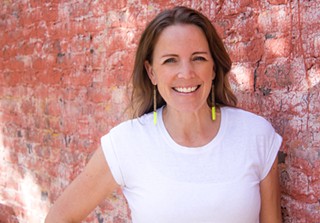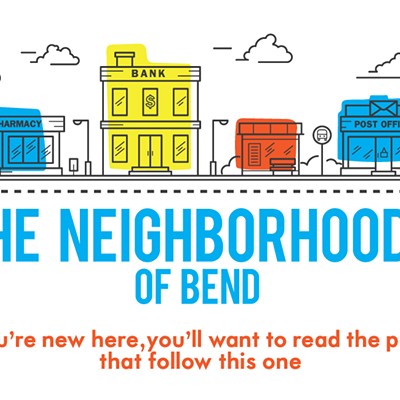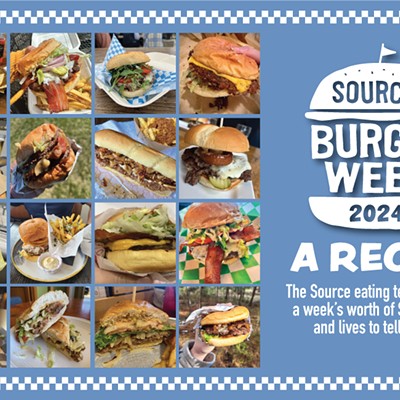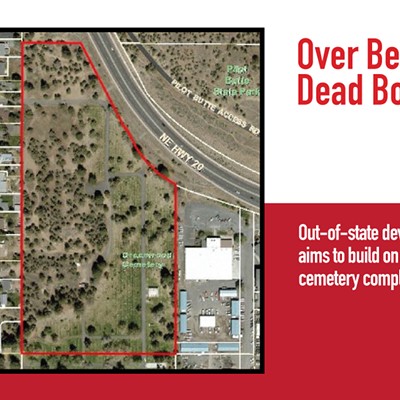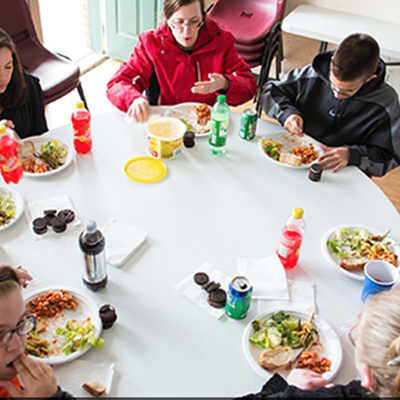Meanwhile, those who have yet to start their careers are seeing the internships that will help get them there canceled.
So, what is it like to actually keep interning for a newspaper, now that newsrooms consist of countless remote desktops at journalists' homes?
Miina McCown, a high school student who started interning at the Source Feb. 21, discusses the dramatic change of her internship at the Source Weekly with Editor Nicole Vulcan.
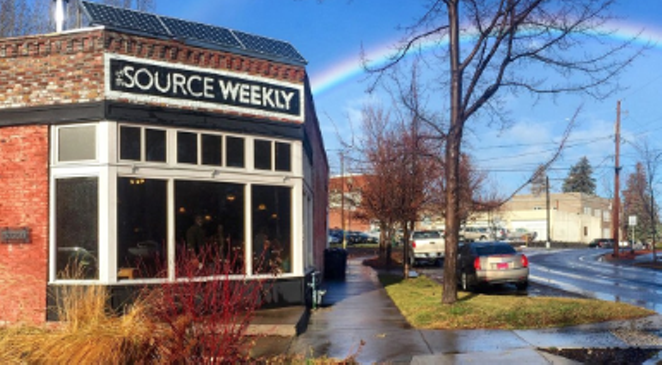
Miina McCown: What would you say has changed the most with the advent of COVID-19 and what has it affected the most in communication and sustaining the business effectively?
Nicole Vulcan: As you know, newsrooms are active and busy places with a lot of interaction going on—and that means that you can communicate ideas and concepts and things to keep the workflow going through just a few words. Well now, you have to turn to a device and type it out. Now, it just means that there’s a lot more written communication across a number of channels. So take myself and Laurel, our reporter… sometimes we’re talking on the phone, sometimes we’re using Slack to send messages, sometimes we’re emailing each other. And that’s just between two people.
So, imagine that across a whole team of contributors; photographers, designers, our publisher, our advertising team, just trying to figure out where and what to communicate with each person. And I’d like to say, “We’re only using Slack today, guys, we’re only communicating through Slack.” But then, you want to forward your coworker an email and then you send a note inside that email, so it just becomes difficult to keep it to just one communication channel.
MM: Through communicating with interns… I know it’s hard for a lot of people right now. It’s hard in general, with communication, especially for younger people. What aspect of that do you think has been affected the most through communicating with interns?
NV: Well, I think one of the things that interns gain in our newsroom—and I think it’s true everywhere—that you’re there absorbing things in your environment, and that’s why typically internships aren’t remote. I had an intern last summer who wanted to do a lot of his work remotely and I was adamant that he didn’t, and we had quite a battle over it. Not because I didn’t think he could do the work, but because there was so much he was going to learn by those day-to-day bantering conversations in the newsroom, and not just between the newsroom staff, but the designers and the advertising team. You just learn so much about the production process by being in that room with us. That’s incredibly valuable and that’s a huge thing that I can’t port to a remote desktop, so it’s hard.
If you read the notes from our past interns, almost every one of them would say something like “It’s so fun,” and “Everyone gets along so well,” and “Everyone laughs and banters together,” and that’s just part of it. And that’s also sort of where creativity bubbles up; one person says one thing, and then another person suggests something else on top of their idea, and the ideas just spiral together, so that’s harder to do when you’re communicating over Slack or your having a group meeting on Zoom where only one person can talk at a time.
MM: Right, I've noticed that when reading past letters from interns, they always discuss how it was interesting to be there and experience all of it, but you’re kind of deprived of all of that when everything is done digitally. You’re never face-to-face with people and it’s difficult to experience what they’re talking about.Under normal circumstances, I take the time to have interns and to mentor people because I want to teach people about this awesome industry that we’re in, but right now anything that adds a little more work to my plate really isn’t ideal. - Nicole Vulcan, editor
tweet this
NV: Yes, that’s why when you and I talk or email or whatever I try to give you a little bit of written explanation as to why we’re doing something, because that’s the stuff you’d naturally get in the room, like “Oh, so we’re assembling this list of grocery stores that have their employees wear masks, because…” instead of me having to explain, you would’ve just known from hearing the conversations around you.
MM: Communication is definitely the aspect that’s hit the hardest. Are there any other parts of the internship that you think are impacted?
NV: Well, you were working on this awesome illustration project, as you have interest in illustration as it pertains to publication. That was a really cool project, but now we’ve had to put it on the back burner because we don’t know when we’ll be able to publish it. So that’s another thing that’s gone by the wayside. And I realize, elsewhere, in other places… had you not already started your internship, at this point I probably wouldn’t take on another intern, to start now, under these circumstances, because it’s just too difficult to onboard people and to get them to understand the vibe and to understand their mission, and also, we’re resource-strapped right now.
Under normal circumstances, I take the time to have interns and to mentor people because I want to teach people about this awesome industry that we’re in, but right now anything that adds a little more work to my plate really isn’t ideal. You had these writing, research, and art tasks… we’ve been able to figure out things for you to do that I think you’re getting some value out of, at least I hope you are.
MM: It’s true that these are very unusual circumstances, and this is something that rarely happens, but do you think that since I'm interning right now, it adds a layer of deeper understanding to what I'm doing in the workplace?
NV: Yeah, you and I have had these conversations about why we were rushing to get this Takeout Guide done, right? The Takeout Guide isn’t exactly a journalistic endeavor, but it is an endeavor that benefitted the community and in turn, benefits us because when the community does well, we do well. We’re funded by advertisers, and those advertisers are the businesses in Central Oregon, so just having that conversation about why were doing this project, why it matters, and why we need everyone to get on board, that probably helped you understand the business side of this industry in a way that another intern probably wouldn’t have had the opportunity to.
In these tough times, we have to start thinking about the things we can do to sustain our business model as well. You’re also just doing a lot of on-the-ground research and reporting… and I've heard it from The Oregonian and The New York Times that this is the most important story we’ll cover in our lifetimes as journalists. We don’t know if that’s actually true, but right now this is the story of our lives and you get to be part of that, and if you choose to be in this industry you get to tell your future employer that you were doing this work at a really important time. So that’s incredibly valuable for you, I think.
MM: It’s interesting to see how the dynamic changes and how businesses function under this kind of pressure, especially since we’re a free paper and we have people take out ads and that’s kind of how we sustain ourselves. It’s also interesting to see right now, with deadlines and whatnot, how it all works together and how things have changed.I'm glad I got to start my internship right before this happened because there was just a period of time at the beginning where I got to see how things ran normally, and after that things changed. But I'm glad I got to see how dramatically things shifted behind the scenes. - Miina McCown, intern
tweet this
NV: Right, and before we had a solid system in place that was centered around our print publication. Basically, we had our deadline: everything was due on Fridays so that we could put it out the following week. Now, we’ve had to completely revise our system to be a daily publication with a daily newsletter, which is our focus and push every day. And so, behind the scenes over here there is just a total shift. There are also spreadsheets; before we had a spreadsheet for every week’s paper, and below that there was another spreadsheet that showed what was going to go into our newsletter based on our coverage, but now it’s just a big spreadsheet of newsletter material, and that’s a total shift for us and a really heavy lift to totally revamp your business model to go completely digital.
MM: With the whole change that comes right now—I feel like our kind of business with print publications get hit the hardest since there’s a schedule that we followed closely, and now we’ve had to change all of that. I'm glad I got to start my internship right before this happened because there was just a period of time at the beginning where I got to see how things ran normally, and after that things changed. But I'm glad I got to see how dramatically things shifted behind the scenes.
NV: Yeah, I'm curious if this has made you consider different career choices or if it’s made you think differently about what kind of career you want to pursue.
MM: Right, you get to see a lot of the tough parts that you don’t normally think about, because if you started at a normal, consistent time you’d see things differently than all the grit and perseverance needed and the difficulties and not just the fun aspects of the work. I don’t think it has changed the way I feel about these types of careers.
Coming in, I knew that it wasn’t going to be fun all the time. I knew there was going to be ups and downs, but I wasn’t 100% sure what to expect. I’d seen characters intern at newspaper publications on television, but that was really the only thing I knew about it. The first time I had found out about this internship, I thought it would be interesting since I love writing and graphic design... everything that goes into it, and I wanted to see how an independent newspaper works. And I knew it wasn’t always going to be what I wanted to do; it wouldn’t always be designing or writing, it would sometimes be making calls, or repetitive tasks that just need to be done. So I wouldn’t say that I'm considering different career choices now, I'm still very much interested in this field, but I just think it’s been fascinating to see how dramatically things can change in the operation.
NV: Yes, you’ve gotten a lot more realistic sense of what this business looks like and the creativity and perseverance that it requires. And also, it’s incredibly interesting that in a time where our community is begging us to do more and sending us story ideas and giving us no shortage of things to investigate, this is when our revenues go the opposite direction. It’s been the question of all media outlets since the dawn of our existence—what models work better than others?
And we’re moving more towards a membership model, we’ve gotten just dozens of new members into our Source Insider program in just the last few days. People have just been showing up and showing us that they support what we do, and that feels really good since a lot of times we don’t hear from our readers. We know, based on web numbers, that they liked the story, I guess, but until they write you and tell you how valuable you are and that they don’t want you to go away, you don’t really know. Miina, what kind of things are there that you’ve wondered about the newspaper that you haven’t able to have answered as a result of this?
MM: I've always thought of a newspaper as something with strict deadlines and where everyone is a part of the machine. Everyone needs to keep up with their share of work in order to keep the whole machine running and everyone has value and an important role to play. If one person doesn’t fulfill what they need to get done, the whole team suffers from it as a result. So the situation we’re in right now has really shown me the importance of that. If one person hadn’t been there to finish that takeout guide, we would have suffered a bit of backlash from that since it was something we had to get out really quickly. It’s shown me the importance of the part each person plays and how that plays through in the end result. Would you say this is the toughest situation of communicating with the intern or giving the intern something to work on?
NV: No, because our work is more important than ever, and there is no shortage of groundwork that you can be doing and you have been doing, and that’s incredibly valuable. Different interns have brought different things to the table. Some have come really motivated and with a lot of skills, and I’d say you fall into that category for sure. I’ve had a lot of high school interns and I've had college interns, and it hasn’t mattered what level of education they have. Some of the college interns I've had have been incredibly hard to motivate to do anything that I find valuable for our newspaper.
Then there have been ones that are innovative and brought their own ideas and usually when they bring their own ideas, they get supported. So, I think that everyone is just different. And I've never regretted having a single one of our interns, because they bring something to the table that we haven’t thought of, or they bring life experience that benefits the community in a different way than we have brought in the past.
In terms of being able to bring you that “learning by osmosis” thing, yes, this is the toughest it has ever been, because I can’t just send you out on a call with a reporter or on an interview to job shadow. That’s one of the things that interns do at least a few times when they intern, is just go and follow other reporters and other staffers—and you’re just not going to get to do that, and that stinks.
See all our Coronavirus coverage at our Coronavirus HQ.

